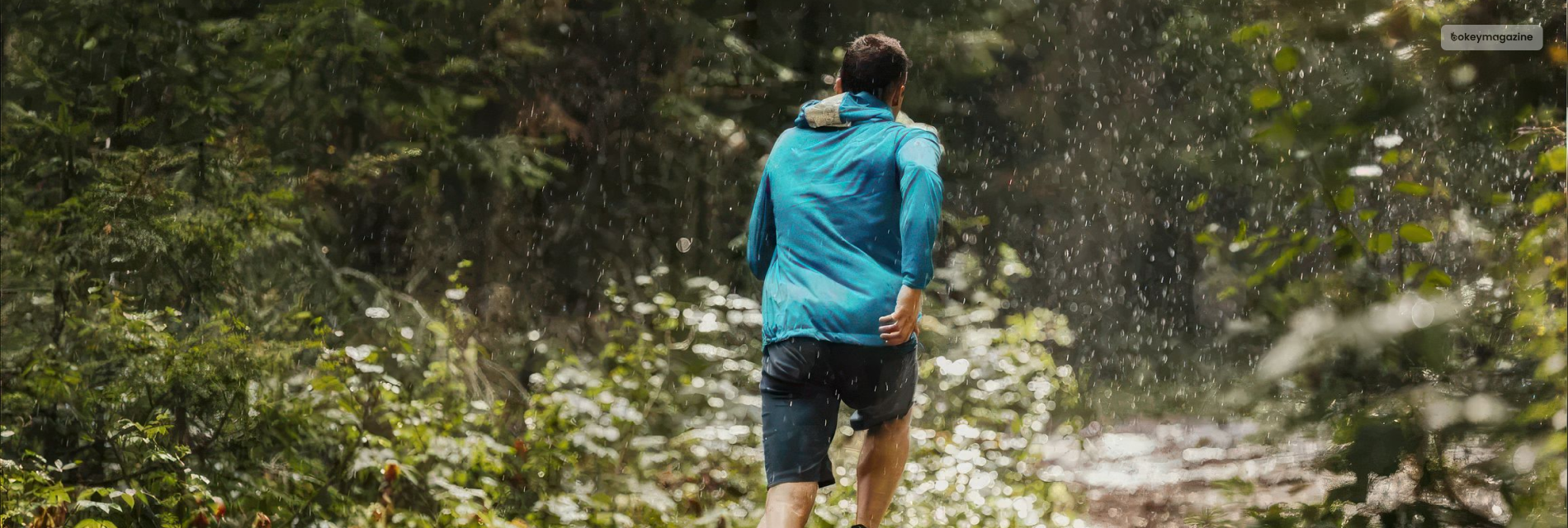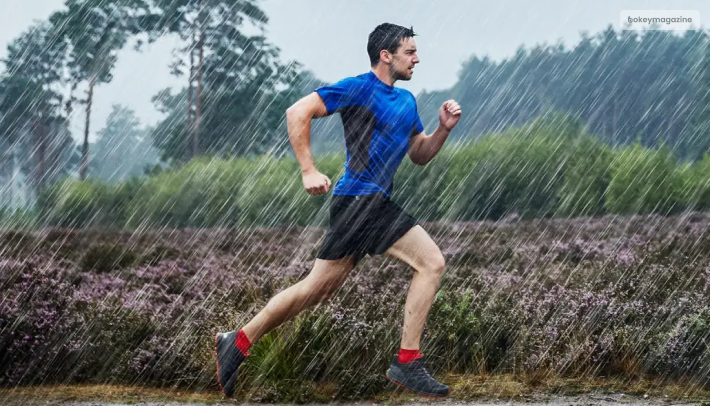
Running In The Rain: Is It Ok To Run In The Rain?
I categorize people generally into two types- ones that love running in the rain, and the others that will see the slightest bit of clouds in the sky and will straight be like, “No thanks!”.
While some people don’t really enjoy the water-clogged clothes and soggy shoes, some live off the thrill of running in the rain. I do, at least.
The calm and the adrenaline that you will have while it showers from the sky, washing every inch of your body, feels phenomenal.
Running in the rain practically has no downsides. Races are never canceled due to rain, so there is no reason why you must cancel your running schedule just because it is pouring outside.
However, there are certain precautions that you must take while running in the rain to make sure that you are totally safe and don’t end up falling sick or hurting yourself in the process.
So, without any further delay, let us explore more about running in the rain and why you must do it more often.
Is Running In The Rain Safe?

Practically speaking, it is safe to run in the rain. However, it would be best if you always looked out for storming, lightning, or downpouring, as said by Audrey Springer, who is a certified running coach at Relentless Runners.
“Runners should always check the weather forecast the night before their runs,” comments Rayn Miller, head running coach, at Maverick Running Community. “This will help you determine when to schedule your run to avoid dangerous conditions.”
However, it is safe to go running in the rain; your performance might take a hit.
“Performance in the rain depends on the conditions you’re running in,” adds Springer. “The heavier the rain, the more likely your performance will suffer.” She suggests going into your run with the expectation that you might not perform as well as usual. “Your body will still reap the benefits of the run even in the tougher than normal conditions,” she further adds.
How To Make Running In The Rain More Enjoyable?

“Running in the rain is a different experience — it’s something new, and the variety alone makes it more exciting,” says Aaron Forrest, Boston Marathon Finisher and a certified coach for Gixo. “It’s nothing to be afraid of, and with a little preparedness, you might even look forward to the raindrops.”
Running in the rain will constantly keep you cool, so that counts as an added benefit.
“I actually ran faster in the crazy rain/wind storm this year compared to last year’s marathon, likely because my heart rate was lower throughout the workout. The heart has to work harder to cool the body in hot temperatures,” Forrest explained.
“Sure, you need a little more mental toughness, and it feels hardcore — but who doesn’t want to feel a little more hardcore?”
This is true. So, if you also want to get the same experience, this is how you can enjoy your run in the rain:
Accept The Fact That You Are Going To Get Wet
Let us be a little practical here. If you are planning on running in the rain, it is a given that you are going to get wet. So rather than crying a river, simply embrace it.
You are not going to the office where you have to worry about your clothes getting wet or your shoes getting soggy. So, drop down all your worries and enjoy the run with your whole heart.
“I run in the rain quite often,” Shaun Bohnsack, director of product, Nature’s Gym Category at Merrell, says. “Living in Michigan, we have great fall weather, and that leads to some fun rainy (and sometimes snowy) runs. If I’m going out for a short run on the trail and it’s not too cold, a lot of times, I will just embrace the rain. Run in a long-sleeve, lightweight shirt, shorts, and shoes that drain well,” he further adds.
Content Director of RunRepeat, Paul Ronto, says that you must skip on the rain jacket if you are running in the rain, which is quite contrasting to what a non-runner might expect.
“When you head out for a run in the rain, you are going to get wet — own it. All a rain jacket is going to do is help you overheat, and odds are, you’ll be carrying it or tying it around your waist before the end of your run,” he adds.
“Instead, layer correctly to ensure you are warm enough but not trapping in heat.”
Quit The Cotton
Cotton is pretty quick in absorbing water. This means when you do get wet, which in fact, you will, the water will be hanging onto the clothes, and all together, the entire experience will be highly soggy.
“Anyone who’s ever gotten wet in cotton knows that it doesn’t feel good,” suggests Gillian Goerzen, who is a health coach and a personal trainer living on the “Wet Coast.”
“Not only will you be more prone to chafing because the wet, cold fabric sticks to your skin — you’ll be more likely to chill. It sounds funny, but technical wool is actually fantastic because it doesn’t feel cold and soggy when wet.”
Ronto further suggested that materials like polyester or merino wool have thermal properties in them, which work even when they get drenched. This makes them considerably warmer and a better choice of fabric for running in the rain.
“As the saying goes, there’s no bad weather, only bad gear,” Mirna Valerio, Merrell Ambassador and ultra runner, further adds. “If you have the right gear for running in rougher weather, you and rain can be friends.”
A Baseball Cap Is A Hit
If you wear contact lenses or glasses, a baseball cap is particularly helpful to protect your eyes while running in the rain.
“I’m a contact lens wearer, and there is pretty much nothing worse than rain in the eyes and irritated contacts,” Goerzen adds.
“Hats rock in the rain — contact lenses or not,” Ronto suggests. “It won’t keep your head dry, but it will keep some of the rain out of your eyes, making it easier to see.”
Make sure that the cap is of polyester or wool, as a standard baseball cap will hold the water and get soggy.
Try To Fetch A Good Pair Of Socks
The ankle cotton socks that you may have gotten at half the price from Target may have been a great deal, but they are not joining you while you go for a run in the rain.
“It’s time to bust out your heavy-duty socks because if your feet ain’t happy… Well, you know the saying, “Good socks are worth the investment!” says Goerzen.
She has a partial opinion about the wool running socks and suggests that the no-cotton tip is particularly important when we speak of socks.
Waterproof Shoes Are Not Compulsory
While for some, a waterproof shoe may seem like a must-have while running in the rain; however, that is not the case.
“If you’re a roadrunner, a waterproof shoe can go a long way in keeping your feet dry,” Goerzen says. “But if you’re a trail runner, I’d personally recommend skipping the waterproof shoes. You’ll more than likely come upon giant puddles you can’t always avoid or small creeks. Consider that once the water is in, it needs a route out.”
Grab On That Good Old Vaseline
Chafing is your ultimate enemy from becoming the total baddie when running in the rain. While you may have just upgraded yourself to become a rain runner, you have to pay the price too- burning raw flesh!
“Think about adding some petroleum jelly like Vaseline to areas like where your socks end on your ankles, under your armpits, and on your bra straps. Nothing ends a run quicker than hot spots and raw skin,” Ronto suggests.
Change The Way You Look At Things
To be able to run in the rain, you first have to change how you look at it. Instead of being gloomy and lazy, please take it as an opportunity to explore the idea of running in the rain.
“Your focus should be on your run, how you feel, and the results,” suggests Andrew Nunez, LA-based Barry’s Bootcamp; running coach. “See the rain as a tool and focus on how it can help you during your run by cooling you down as you clock in at the pace you’re striving for.”
Wrapping Up
Running in the rain is one of the most wholesome experiences that you may ever get. The moment you stop seeing rain as an obstacle, it becomes way more manageable for you to run in the rain.
However, you must always be cautious when you are going out for a run in the rain. Try to stay away from muddy roads or slippery areas. Also, make sure you are not among the ones that quickly catch a cold. Running in the rain, in that case, might end up being problematic for you. Stay properly clothed and make sure the rain is manageable enough.
Just take the necessary precautions, and you are good to go!
Read Also:



















Post Your Comment